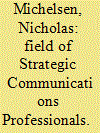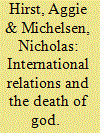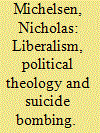|
|
|
Sort Order |
|
|
|
Items / Page
|
|
|
|
|
|
|
| Srl | Item |
| 1 |
ID:
164406


|
|
|
|
|
| Summary/Abstract |
Communication has long been accepted as integral to the conduct of international affairs. The role that discourses, ideas, norms, and narratives play at the systemic level of world politics has been examined extensively. Scholarly interest has now turned to how international actors use political communication tools to create and counter threats, such as propaganda, hybrid warfare, fake news, and election tampering, and it is often taken for granted that states are inferior to their challengers in these domains. To address this, ‘Strategic Communications’ has emerged as a mode of thought and practice promising to enhance state communication; encompassing long-established activities including public diplomacy, public relations, nation branding, and information operations. In this developing field, private sector professionals are increasingly being called on to support and advise governments. Particular attention has been paid to the ‘Big Data’ private companies may have access to, but there has been little IR research examining the experts seeking changes in how strategic communications is practised. Informed by elite interviews with communication professionals across the public-private space, this article sets out a research agenda to fill this gap, enhancing understanding of the expert relationships that shape international strategic communications.
|
|
|
|
|
|
|
|
|
|
|
|
|
|
|
|
| 2 |
ID:
124628


|
|
|
|
|
| Publication |
2013.
|
| Summary/Abstract |
Friedrich Nietzsche's proclamation of the 'Death of God' has come to function as something akin to a heuristic device in International Relations (IR) signifying the shattering of metaphysical and ontological certainty in European (post)modernity. According to Chris Brown, Nietzsche's declaration is commonly believed to signify a 'crisis in thought' which constitutes a 'genuine danger' insofar as it risks 'the collapse of the foundations of the old world order'.1 Roland Bleiker notes that such a crisis is deemed by many to be symptomatic of the loss 'of a generally accepted worldview that provided a stable ground from which it was possible to assess nature, knowledge, common values, truth, politics - in short, life itself'.2 This forum seeks to interrogate the substance and consequences of the claim that 'God is Dead' in the context of global politics, and specifically its implications for IR theory, contemporary political violence, and questions of ethics and responsibility.3 Before providing an overview of the points of synergy, agonism and divergence in the papers, this introduction will offer some contextualising remarks relating to the metaphysical, conceptual and historical parameters of the 'Death of God', marking its emergence in European political thought and provisionally mapping the terrain of its pertinence to contemporary IR.
|
|
|
|
|
|
|
|
|
|
|
|
|
|
|
|
| 3 |
ID:
124627


|
|
|
|
|
| Publication |
2013.
|
| Summary/Abstract |
This article sets out to interrogate the relationship between Liberalism and suicide bombing. It maps and critically examines accounts of suicide bombing as a practice diametrically opposed to the secular logics of liberal governance, or as the direct expression of the traces of sovereign exceptionalism that haunt the global operation of Liberal biopower. I argue that a uniquely liberal analytic of human finitude establishes conditions of political intelligibility for suicide bombings today. As such, the contemporary politics of suicide may be understood as in critical communication with liberal political theologies of immanent governance over the human qua mortal, rather than as structurally deriving from political theologies of sovereign power.
|
|
|
|
|
|
|
|
|
|
|
|
|
|
|
|
|
|
|
|
|